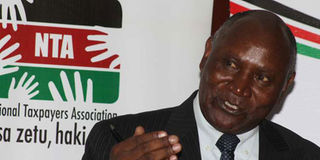Departments spent over Sh24.5bn irregularly

Auditor-General Edward Ouko, whose report for the 2013/14 fiscal year, which was tabled in the National Assembly on July 26, 2015, indicates that eight ministries and departments used a total of Sh24,566,651,642 beyond what had been allocated to them. FILE PHOTO | JENNIFER MUIRURI | NATION MEDIA GROUP
What you need to know:
- Normally, these offices have to get Parliament’s approval before they spend any extra money, but the report shows that the Ministry of Health used Sh24 billion without the greenlight.
- The document published by the Auditor-General’s office indicates that ministries and their departments had used more money in 2012/13 without the required approval (Sh38.4 billion).
- The Independent Electoral and Boundaries Commission incurred an extra Sh1.46 billion, but the auditor could not classify whether it was recurrent or development.
Government ministries and departments spent more than Sh24.5 billion without getting the required approval for expenditure, a report on financial spending shows.
The Auditor-General’s report for the 2013/14 fiscal year, which was tabled in the National Assembly on Tuesday, indicates that eight ministries and departments used a total of Sh24,566,651,642 beyond what had been allocated to them.
Normally, these offices have to get Parliament’s approval before they spend any extra money, but the report shows that the Ministry of Health used Sh24 billion without the green light.
This is the highest among the eight departments involved in the excess expenditure, according to the Auditor-General.
Others are the Agricultural Information Resource Centre Revolving Fund (Sh125.5 million); the Ministry of Energy and Petroleum (Sh8.3 million); the Ministry of Transport and Infrastructure (Sh77 million); the National Police Service Commission (Sh1.1 million); the National Youth Service Mechanical and Transport Fund (Sh138 million); the Parliamentary Service Commission (Sh171.4 million); and the Prisons Industries Fund (Sh5.4 million).
Health Cabinet Secretary James Macharia yesterday disputed the figure attributed to his ministry.
“Before you decide how much is spent, you first check how much was allocated to the ministry in the Budget. The Auditor-General should send competent staff to make audits to avoid putting his office in disrepute.
“The figure quoted in that report is blatantly wrong. We do not spend money we don’t have. We even returned some money to the Treasury. Where did that come from?” he told the Nation by phone.
Last year, the ministry had to deal with cholera outbreaks in Nairobi, Kirinyaga, Murang’a, Mombasa, Kilifi and Trans Nzoia, among other counties.
There were also serious cases of malaria in four western Kenya counties, and the ministry had to buy nets, mosquito egg-killing chemicals as well as more subsidised anti-malarial drugs.
EBOLA EMERGENCY
However, Mr Macharia said these cases had been budgeted for under an emergency fund, which usually comes as part of the money allocated to the ministry.
“Only the Ebola outbreak affected us because we did not anticipate that it will come to Africa. But we got the money (Sh670 million) for that emergency from the Treasury.”
The document published by the Auditor-General’s office indicates that ministries and their departments had used more money in 2012/13 without the required approval (Sh38.4 billion).
The latest figures may indicate a trend of using shortcuts in government spending.
The report notes that the excess money spent in 2013/14 does not include Sh16.6 billion worth of unsettled bills, as they were carried forward to the current fiscal year.
The government owes Sh9.7 billion in excess debts incurred through recurrent expenditure and Sh2.6 billion in development bills. The Ministry of Health incurred extra debts worth Sh2.1 billion, although the auditor has labelled the bill as “not classified”.
Had these bills been included on the list of excess expenditure, six more government departments would have been involved.
Education and Devolution ministries owe the highest debts in excess recurrent expenditure, at Sh7.8 billion and Sh1.1 billion, respectively. Others include Lands (Sh392.5 million), the Judiciary (Sh297 million), Agriculture (Sh35.8 million) and the Department of Justice (Sh17 million).
The Independent Electoral and Boundaries Commission incurred an extra Sh1.46 billion, but the auditor could not classify whether it was recurrent or development.




